
In my composition class at Sichuan University, in the southwestern assignment was a personal essay. I gave some prompts in case students had trouble coming up with topics. One suggestion was to describe an incident in which the writer had felt excluded from a group. Another was to tell how he or she had responded when some endeavor went unexpectedly wrong. For the third prompt, I wrote: Have you ever been involved in a situation that was extremely threatening, or dangerous, or somehow dramatic? Tell the story, along with what you learned.
It was September, 2019, and the class consisted of engineering majors who were in their first month at university. Like virtually all Chinese undergraduates, they had been admitted solely on the basis of scores on the gaokao, the national college-entrance examination. The gaokao is notorious for pressure, and most of my students chose to write about some aspect of their highschool experience. One girl described a cruel math instructor: "He is the person whose office you enter happily and exit with pain and inferiority." Edith, a student from northern Sichuan Province, wrote about feeling excluded from her graduation banquet, because her father and his male work colleagues hijacked the event by giving long-winded speeches that praised one another. "That's what I hate, being hypocritical as some adults," she wrote.
Few students chose the third prompt. Some remarked that nothing dangerous or dramatic had ever happened, because they had spent so much of their short lives studying. But one boy, whom I'll call Vincent, submitted an essay titled "A Day Trip to the Police Station."
This story is from the April 08, 2024 edition of The New Yorker.
Start your 7-day Magzter GOLD free trial to access thousands of curated premium stories, and 9,000+ magazines and newspapers.
Already a subscriber ? Sign In
This story is from the April 08, 2024 edition of The New Yorker.
Start your 7-day Magzter GOLD free trial to access thousands of curated premium stories, and 9,000+ magazines and newspapers.
Already a subscriber? Sign In

YULE RULES
“Christmas Eve in Miller’s Point.”
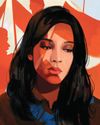
COLLISION COURSE
In Devika Rege’ first novel, India enters a troubling new era.

NEW CHAPTER
Is the twentieth-century novel a genre unto itself?

STUCK ON YOU
Pain and pleasure at a tattoo convention.
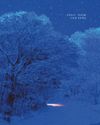
HEAVY SNOW HAN KANG
Kyungha-ya. That was the entirety of Inseon’s message: my name.
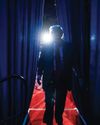
REPRISE
Reckoning with Donald Trump's return to power.
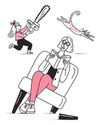
WHAT'S YOUR PARENTING-FAILURE STYLE?
Whether you’re horrifying your teen with nauseating sex-ed analogies or watching TikToks while your toddler eats a bagel from the subway floor, face it: you’re flailing in the vast chasm of your child’s relentless needs.

COLOR INSTINCT
Jadé Fadojutimi, a British painter, sees the world through a prism.
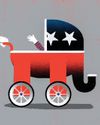
THE FAMILY PLAN
The pro-life movement’ new playbook.
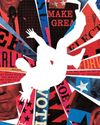
President for Sale - A survey of today's political ads.
On a mid-October Sunday not long ago sun high, wind cool-I was in Harrisburg, Pennsylvania, for a book festival, and I took a stroll. There were few people on the streets-like the population of a lot of capital cities, Harrisburg's swells on weekdays with lawyers and lobbyists and legislative staffers, and dwindles on the weekends. But, on the façades of small businesses and in the doorways of private homes, I could see evidence of political activity. Across from the sparkling Susquehanna River, there was a row of Democratic lawn signs: Malcolm Kenyatta for auditor general, Bob Casey for U.S. Senate, and, most important, in white letters atop a periwinkle not unlike that of the sky, Kamala Harris for President.